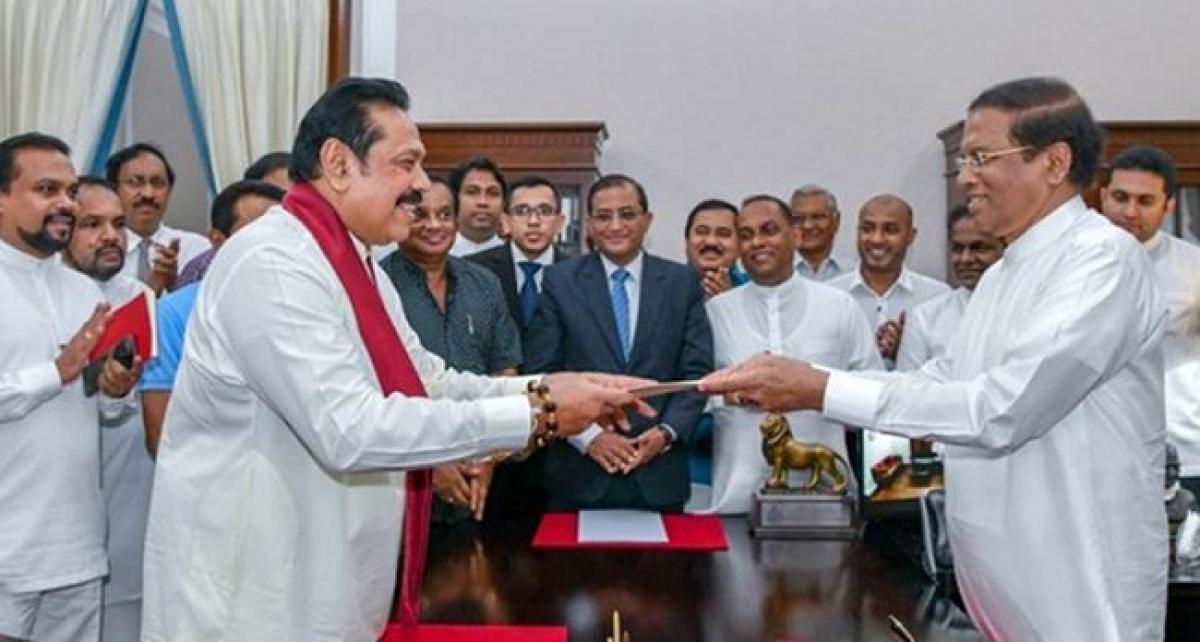Live
- PM Modi greets Minister Pralhad Joshi on his birthday
- Tirupati: Take up repairs of damaged roads, officials told
- Pawan Kalyan meets Vice President Jagdeep Dhankar, Continues Delhi Visit
- Heavy rain alert for Tirupati district due to low pressure
- EPACK Prefab constructs India’s fastest-built structure in 150 hrs
- Woman and her kids die under suspicious circumstances
- BMTC to increase bus running time on each route to drivers and conductors
- PDS implementation in Nalgonda sets a benchmark
- Ph D awarded
- BJP stands strong against Waqf Board misuse
Just In

In a major setback to Sri Lankan President Maithripala Sirisena, the Supreme Court Tuesday overturned his controversial decision to dissolve Parliament and ordered a halt to preparations for snap elections on January 5
Colombo: In a major setback to Sri Lankan President Maithripala Sirisena, the Supreme Court Tuesday overturned his controversial decision to dissolve Parliament and ordered a halt to preparations for snap elections on January 5.
A three-member bench, including country's chief justice Nalin Perera, delivered its ruling after two days of deliberations on as many as 13 petitions against and five for Sirisena's November 9 decision to dissolve Parliament, nearly two years before the its term was to end.
Sirisena dissolved Parliament after it became clear that he lacked support from lawmakers to instal former strongman Mahinda Rajapaksa as the new prime Minister following his October 26 sacking of Ranil Wickremesinghe as premier.
All petitions filed against Sirisena's decision will be heard on December 4, 5 and 6, the apex court ruled, according to the opposition party officials attending the hearing held under tight security.
Major political parties and an election commission member Ratnajeevan Hoole on Monday dragged Sirisena to the Supreme Court, challenging his move of dissolving Parliament, almost 20 months before its term was to end.
Sirisena dissolved Parliament and ordered snap election on January 5, plunging the country's into an unprecedented political and constitutional crises. Rajapaksa needed the support of minimum 113 parliamentarians in the 225-member House to prove his majority.
Wickremesinghe has maintained that his sacking by Sirisena was unconstitutional and illegal and was still the prime minister. Sirisena on Sunday stoutly defended his move to dissolve Parliament, saying it was taken to prevent clashes among rival lawmakers.
He said there were reports that politicians would clash during the floor test, which was due on November 14.
At the hearing Tuesday, Attorney General Jayantha Jayasuriya, on behalf of the state, justified Sirisena's action, saying the powers of the President are clear and unambiguous as provided for in the Constitution and the announcement of the dissolution of Parliament was done by the President in accordance with the Constitution. He pleaded for the dismissal of all petitions and said the President is empowered to dissolve Parliament.
Rajapaksa, 72, who ruled Lanka for a nearly decade from 2005, was unexpectedly defeated by his deputy Sirisena in the presidential election held in January 2015 with the support from Wickremesinghe's UNP.
However, the power-sharing arrangement between Sirisena and Wickremesinghe became increasingly tenuous on several policy matters, especially on issues like the economy and security. And subsequently, Sirisena abruptly ousted Wickremesinghe and replaced him with Rajapaksa.

© 2024 Hyderabad Media House Limited/The Hans India. All rights reserved. Powered by hocalwire.com







